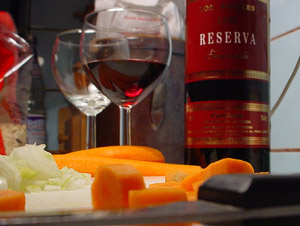
December 15, 2015
High doses of an ingredient found in red wine and chocolate stabilized levels of a brain protein linked to the progression of Alzheimer’s disease, a preliminary trial found. The results suggest that the compound, called resveratrol, might have an effect on Alzheimer’s, but more study is needed to determine whether it might help to slow the progression of the disease.
The study, conducted at 21 medical centers across the country, examined the effects of a specially prepared resveratrol concentrate in 119 people with mild to moderate Alzheimer’s disease.
Study participants were divided into two groups. Half got increasing doses of a purified, high-dose form of resveratrol. The other group got a placebo dummy pill. The highest dose of resveratrol tested was one gram by mouth twice a day — equivalent to the amount found in about 1,000 bottles of red wine. The dose was much higher than that available in resveratrol supplements in health food stores, many of which also contain impurities (some act as powerful laxatives).
Over the course of a year, those who got the resveratrol showed stable blood and spinal fluid levels of a protein called beta-amyloid-40. The protein comes in various forms and is a hallmark of Alzheimer’s disease. As Alzheimer’s progresses, levels of beta-amyloid-40 typically decrease in the blood and spinal fluid, while increasing in the brain.
There was no proof that resveratrol improved memory in those who took it, though people in the resveratrol group had slight improvements in their ability to carry out daily tasks, such as remembering to brush their teeth.
While the results are promising, “we can’t conclude from this study that the effects of resveratrol treatment are beneficial,” said study leader Dr. R. Scott Turner, director of the Memory Disorders Program at Georgetown University Medical Center. “This is a single, small study with findings that call for further research to interpret properly.”
The high doses of resveratrol seemed to be generally safe and well tolerated; some people had digestive upset. The researchers are planning a larger study in the coming year. The findings appeared in the journal Neurology.
Resveratrol has been studied for a range of potential health benefits, perhaps most notably for its potential to extend lifespan. It appears to activate cell proteins known as sirtuins, the same proteins activated by severe calorie restriction. Whether resveratrol extends lifespans – or slows Alzheimer’s — in people remains unknown.
Resveratrol is a naturally occurring compound found in foods including grapes, red wine, blueberries and dark chocolate. If continued research shows the compound has benefits against Alzheimer’s, new drugs might be developed to better target the disease.
By ALZinfo.org, The Alzheimer’s Information Site. Reviewed by William J. Netzer, Ph.D., Fisher Center for Alzheimer’s Research at The Rockefeller University.
Source: R. Scott Turner, MD, PhD; Ronald G. Thomas, Ph,; Suzanne Craft, PhD, et al: “A randomized, double-blind, placebo-controlled trial of resveratrol for Alzheimer disease.” Neurology, published online Sept. 11, 2015











